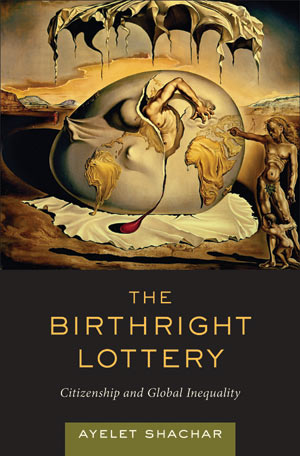The Birthright Lottery proposes a new way of thinking about the intergenerational transfer of citizenship as a special kind of property inheritance. It emphasizes the significance of citizenship – perhaps the most important goods and opportunity-allocating institution of the modern era. This new framework highlights the uneasy connection between station of birth and membership in distributing rights, opportunities and wealth.
At present, citizenship, with all its blessings, is awarded by the accident of birth. This is entrenched by two legal principles: jus soli (“by birth on the territory”) and jus sanguinis (“by bloodline”). As a result, access to affluent countries in our unequal world is still reserved primarily to those born in a particular territory or to a particular ancestry; those born on the wrong side of the border of security and prosperity are shut out.
This is as surprising as it is disturbing: we typically associate citizenship with democracy, participation, and accountability, making such membership the domain of social and political life where we would least expect to find inherited entitlement living on.
And what a significant inherited entitlement citizenship is: in our world, the global disparities are so great that under the present regimes governed by birthplace or bloodline, “some are born to sweet delight” as William Blake memorably put it, while others (through no fault or responsibility of their own) are “born to endless night.” The reality of our world is that the endless night is more prevalent than the sweet delight. No less than 97 percent of the global population who are assigned citizenship by the lottery of birth either choose, or are forced, to keep it this way.
To overcome this feudal-like system of allotting life chances, some have suggested abolishing borders. But, the latest statistics show that approximately only 1.75 million immigrants are admitted annually by leading OECD countries. The population residing in the world’s poorer or less stable regions amounts to roughly 4.5 billion. This leads to a ratio of 1:1500 between those granted admission and those who may wish it. Even if the world’s wealthy countries declared their borders as open as possible, the problem would not dry up.We need fresher ideas instead.
And this book begins to do just that—first by highlighting the puzzling persistence of birthright in the transmission of membership in the twenty-first century, and by drawing upon real-life legal examples from a number of countries.By providing a telling account of the historical origins and contemporary effects of birthright membership, I reveal the deep-seated problems of hereditary citizenship.
But my analysis does not stop there. The Birthright Lottery also outlines hard-nosed legal remedies that aim to alleviate the most glaring opportunity inequalities that are attached to this system.It is here that the analogy to property proves most useful. The Birthright Lottery draws upon influential ideas and already-tested institutions developed by economists and political thinkers in order to curtail inheritance. I put these to work as guidelines for alleviating some of the most profound opportunity inequalities that currently attach to the birthright lottery—the extraordinary and unjust system of allotting, by law, membership titles and life chances according to nothing but circumstance of birth.



